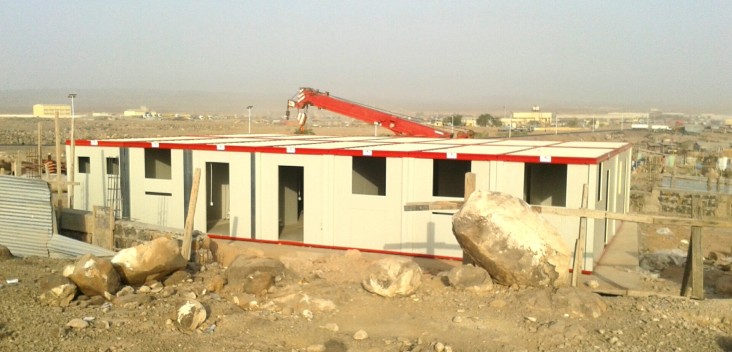
This new building sits on the site of a groundbreaking public-private partnership.
Later this year, it will be part of a new SafeTStop--a health center designed to provide HIV/AIDS prevention, malaria and TB services for local community members as well as thousands of truckers who arrive from Ethiopia everyday carrying goods to and from the Port of Djibouti.
The SafeTStop—called "PK-12" after this roadside settlement about 12 kilometers from Djibouti town—will be the newest in a network of health facilities for communities and truckers across the major highways of East Africa. Supported by USAID, SafeTStops generally provide recreation (television, billiards, etc.) to attract clients, and offer voluntary HIV/AIDS testing, peer counseling and outreach, HIV/AIDS education in the community, and condoms as well other basic health services.
"This stop is very helpful," said one Ethiopian driver, "especially to get supplies like condoms. But to actually get tested and counseled, you have to go through town to a clinic. It will be very good to have it all in one place."
This center represents a public-private partnership between the Government of the Republic of Djibouti; USAID; FHI 360, a U.S.-based NGO; and Dubai Ports World, which runs the Port of Djibouti. The Djibouti Ministry of Health is providing the land as well as medical equipment. Dubai Ports World will construct and furnish the facility, USAID provides support through the President’s Emergency Plan for AIDS Relief plus technical assistance, and FHI 360 is the implementing partner.
The need for the center is great around the massive PK-12 truck stop, where on any day thousands of huge vehicles lie in parking lots that stretch nearly as far as you can see. The main shipping routes connecting Asia, Africa and Europe all converge at the Port of Djibouti. About 70 percent of imports are destined for Ethiopia—a landlocked country of 85 million. Although an Ethiopian-Djibouti railway exists, it has come under disrepair in recent years, so long-distance truckers haul most of Ethiopia’s trade.
Truckers typically spend four or five days around PK-12, waiting for their next load from the port. It's no surprise that large numbers of young people from the neighborhood, with few economic opportunities, get drawn into sex work.
Already truckers are looking forward to the new facility, which is scheduled to begin service in October 2013. Currently, recreation and HIV/AIDS education is provided in a tiny “building” of one cargo container atop another.







Comment
Make a general inquiry or suggest an improvement.